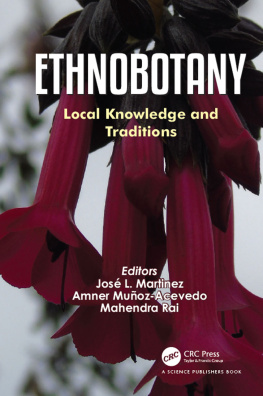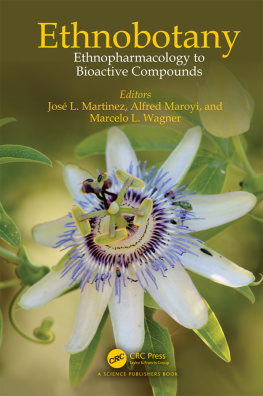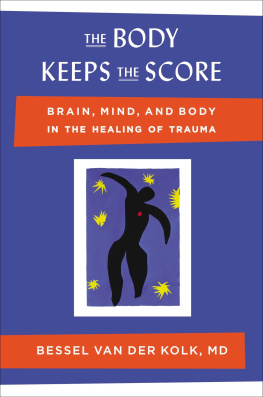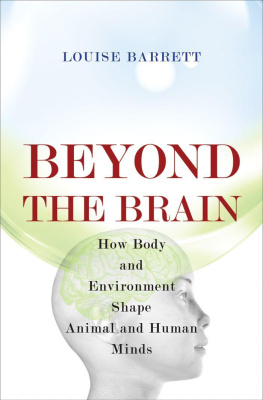Contents
Page List

ETHNOBOTANY
Local Knowledge and Traditions
Editors
Jos L. Martinez
Vice Rectory of Research
Development and Innovation
Universidad de Santiago de Chile
Santiago, Chile
Amner Muoz-Acevedo
Chemistry and Biology Research Group
Department of Chemistry and Biology
Universidad del Norte
Barranquilla, Colombia
Mahendra Rai
Department of Biotechnology
SGB Amravati University
Amravati, Maharashtra, India

Cover credit: Reproduced by kind courtesy of Prof. Amner Muoz-Acevedo (co-editor)
CRC Press
Taylor & Francis Group
6000 Broken Sound Parkway NW, Suite 300
Boca Raton, FL 33487-2742
2019 by Taylor & Francis Group, LLC
CRC Press is an imprint of Taylor & Francis Group, an Informa business
No claim to original U.S. Government works
Printed on acid-free paper
Version Date: 20181026
International Standard Book Number-13: 978-1-138-38898-7 (Hardback)
This book contains information obtained from authentic and highly regarded sources. Reasonable efforts have been made to publish reliable data and information, but the author and publisher cannot assume responsibility for the validity of all materials or the consequences of their use. The authors and publishers have attempted to trace the copyright holders of all material reproduced in this publication and apologize to copyright holders if permission to publish in this form has not been obtained. If any copyright material has not been acknowledged please write and let us know so we may rectify in any future reprint.
Except as permitted under U.S. Copyright Law, no part of this book may be reprinted, reproduced, transmitted, or utilized in any form by any electronic, mechanical, or other means, now known or hereafter invented, including photocopying, microfilming, and recording, or in any information storage or retrieval system, without written permission from the publishers.
For permission to photocopy or use material electronically from this work, please access www.copyright.com (http://www.copyright.com/) or contact the Copyright Clearance Center, Inc. (CCC), 222 Rosewood Drive, Danvers, MA 01923, 978-750-8400. CCC is a not-for-profit organization that provides licenses and registration for a variety of users. For organizations that have been granted a photocopy license by the CCC, a separate system of payment has been arranged.
Trademark Notice: Product or corporate names may be trademarks or registered trademarks, and are used only for identification and explanation without intent to infringe.
Library of Congress Cataloging-in-Publication Data
Names: Martinez, Jose L. (Jose Luis), 1959- editor. | Munoz-Acevedo,
Amner, editor. | Rai, Mahendra, editor.
Title: Ethnobotany: local knowledge and traditions / editors: Jose L. Martinez (Universidad de Santiago de Chile), Amner Munoz-Acevedo
(Universidad del Norte Barranquilla), Mahendra Rai (SGB Amravati University).
Description: Boca Raton, FL : CRC Press, [2018] | Includes bibliographical references and index.
Identifiers: LCCN 2018041061 | ISBN 9781138388987 (hardback)
Subjects: LCSH: Ethnobotany. | Medicinal plants.
Classification: LCC GN476.73 .E845 2018 | DDC 581.6/36--dc23
LC record available at https://lccn.loc.gov/2018041061
Visit the Taylor & Francis Web site at
http://www.taylorandfrancis.com
and the CRC Press Web site at
http://www.crcpress.com
The local knowledge or indigenous knowledge of the use of plants is based on the wisdom and experience of the local community since ancient time. In due course of time, this knowledge becomes the tradition of the local community or tribes. Such knowledge is passed from one generation to another generation and is applied in agriculture, medicines and other household activities. In the past decade, the botanists have made tremendous efforts to gather this knowledge, and eventually, a new branch of botany known as Ethnobotany has originated.
Ethnobotany has always been used as primary source to search biologically active molecules (ca. 60%) from nature and at the same time, it has contributed to the development of drugs (pharmaceutical industry) that have improved the quality of human life. However, some active constituents found within those plants are not the result of the scientific validations based on traditional medicinal uses of plants containing them. On the other hand, there are a few documents/books on ethnobotany (e.g., WHO monographs) containing information about plant-based treatment for specific chronic diseases such as hypertension, cancer, CNS disorders, psoriasis, and urolithiasis, etc.
Most of the plants described in the present book have been used in traditional medicine by local community for specific ailments and the biological activities related to each sickness have been scientifically verified.
We hope that the present book will be an appropriate consultation tool for scientists/professionals/experts such as ethnobotanists, botanists, cell/molecular biologists, chemists, pharmacists, pharmacologists, and environmentalists/ ecologists. It will also be useful for undergraduate and postgraduate students from the same areas and for the pharmaceutical industries.
Jos L. Martinez
Amner Muoz-Acevedo
Mahendra Rai
Contents
Erika Fernanda de Matos Vieira, Maria da Graa Ribeiro Campos and Flvia Cristina Arajo Lucas
Santiago Peredo Parada and Claudia Barrera
Marcelo L. Wagner, Leonardo M. Anconatani, Rafael A. Ricco, Beatriz G. Varela and Gustavo C. Giberti
Melina F. Chamorro, Ana Ladio and Soledad Molares
Juan F. Seminario Cunya, Berardo Escalante Zumaeta and Alejandro Seminario Cunya
Soledad Molares, Ana H. Ladio and Nicols Nagahama
Carolina Alves dos Santos, Marco V. Chaud, Valquria Miwa Hanai Yoshida, Raksha Pandit, Mahendra Rai and Yoko Oshima-Franco
Tanmay Chowdhury, Subhas Chandra Roy and Dilip De Sarker
Jos Luis Ros, Guillermo R. Schinella and Isabel Andjar
Mara I. Stegmayer, Norma H. Alvarez, Melina G. Di Liberto, Lucas D. Daurelio and Marcos G. Derita
Milan S. Stankovi and Nenad M. Zlati
Rosa Luisa Degen de Arra, Yenny Gonzlez and Esteban A. Ferro B.
Shubhangi N. Ingole
Arline Martnez, Luisauris Jaimes, Raul Vinet, Tiare Segura, Claudio Laurido and Jos L. Martnez
Shandesh Bhattarai
Erika Fernanda de Matos Vieira,

Universidade do Estado do Par, Belm, Par, Brasil.
Observatory of Herb-Drug Interactions/Faculty of Pharmacy, University of Coimbra, Heath Sciences Campus, Azinhaga de Santa Comba, Coimbra Portugal.
Coimbra Chemistry Centre (CQC, FCT Unit 313) (FCTUC) University of Coimbra, Rua Larga, Coimbra, Portugal.
Herbrio MFS, Universidade do Estado do Par, Belm, Par, Brasil, Rua do Una, n156, Telgrafo.
Introduction
Studying the historical ethnobotany of medicinal plants is a new method of obtaining information about plants and people derived from historical records, including documents about botany, anthropology, ecology, and history that are still used and relevant today (Prance 2000, Medeiros 2009). Living and learning with diverse ethnic groups have provided valuable contributions to the development of research about natural products, as well as knowledge about the close relationship between the chemical structures of compounds and their biological properties (Viegas Jnior et al. 2006).













